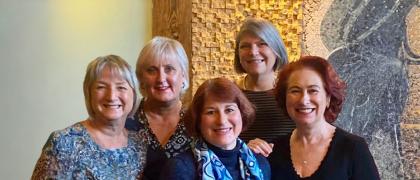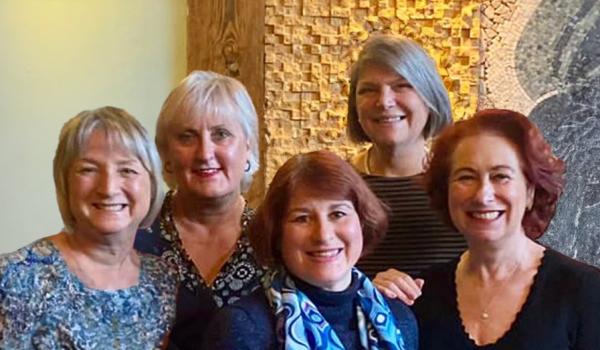Sitting around the table are five women. They look like anyone else in the restaurant, pouring ‘just one more’ glass of wine, smiling and laughing away.
But they’re not like anyone else.
These are the Fabulous Five.
And why are they so fabulous? Because despite all being diagnosed with ovarian cancer, these women are determined to change the future for women.
Meet Anne, Alison, Karen, Nicole and Sue, who share 54 years of survival since their diagnoses, way above the predicted average.

“I never thought I’d meet my grandchildren,” Sue Stockham, 65 years old from Kent, said - who was diagnosed in 2017 with stage 3 ovarian cancer. “Soon, I’ll be holding my fourth grandchild.”
The friends met through our Ovarian Cancer Community group on Facebook and meet regularly to support one another, celebrate every milestone, but most importantly to find ways to prevent this disease devastating more lives.
A focus point for the group is about raising awareness and educating the public and healthcare professions on the symptoms and risk factors.
Ovarian cancer is the sixth biggest cancer killer of women, yet there is a distinct lack of knowledge about the disease. Alongside increasing public awareness, we're working to improve awareness among healthcare professionals as 46% of GPs still incorrectly believe symptoms are only present in the later stages of the disease.
Sue said:
The sad fact is not enough people know about the disease to even air their concerns to their GP and so many women wrongly believe a cervical screening can detect ovarian cancer but it does not. So I try my best to do what I can to help women know more. I said to my GP at the time that I was concerned it could be ovarian cancer, and she stated ‘absolutely not’. I had a CA125 blood test done which measured my levels of CA125 (a protein). A normal level is 35 – mine was over 6,500 which indicated that something was seriously wrong.
Sitting across from Sue is Karen Taylor. “Routine screening for women, before symptoms present, is something that needs to be prioritised.” Karen, now 67 years old from Hampshire, was diagnosed out of the blue when she was seeing a gynaecologist for prolapse. “He wanted to do an ultrasound to check everything. That’s when a mass was found and he suspected I had ovarian cancer. I knew very little about ovarian cancer and had no idea about the symptoms.”
Our research shows awareness of ovarian cancer remains concerningly low, with just one in five women able to name bloating as a main symptom. Misconceptions continue to prevail, which can lead to a delayed diagnosis of ovarian cancer, when the disease is harder to treat.
A common misconception is that hereditary ovarian cancer is only passed down on the mother’s side. This is not the case. A person could be at high risk if they have two or more cases of breast and/or ovarian cancer in their family history, on either side.
Alison said:
I had no idea that you could inherit the BRCA gene mutation from your father. It was such a shock then finding out my daughter Gaby was also a carrier, it totally broke our hearts.
In 2014, Alison Dagul, now 62 from London, was diagnosed with stage 4 ovarian cancer together with breast cancer. June marks 10 years since that diagnosis. “I've made it my mission to find out everything I can about BRCA and its link to both ovarian and breast cancer. Now we have the knowledge we also have the power to keep the next generation safe.”
Up to 20% of ovarian cancer cases occur because of changes (a variant) to one or more genes known to increase the risk of ovarian cancer.
Alongside Alison, 58 year old Nicole Foinette, from Bedford has a gene variant which is known as lynch syndrome, but wasn’t discovered until her cancer returned in 2014.
“Until I had my appointment with the genetics team I had never heard of lynch syndrome, although I knew about BRCA. As a result all relevant family have now been tested. Those who have been diagnosed with lynch syndrome can now make informed decisions about their health. Many will or have had a hysterectomy, and we are all monitored closely by the health team. This will reduce the risk of ovarian cancer, or at the very least ensure it is diagnosed early.”
First diagnosed in 2004 with endometrioid ovarian cancer, Nicole was just 39 years old:
I didn't really know much about ovarian cancer before my diagnosis and did not know the symptoms. Two years earlier I was referred to the gynaecologist for heavy bleeding and was diagnosed with fibroids. At 39, I returned with the same symptom. Both my doctor and I were shocked when the results indicated ovarian cancer, as it wasn’t on our radar. It was after my diagnosis that I realised I had been experiencing other symptoms too - bloating, abdominal pain and feeling full quickly – but I didn’t know the significance.
Nodding in agreement is Anne Ainsworth, 63 from Bath, diagnosed in 2014 with stage 3 ovarian cancer. She added:
“I didn’t know anything about ovarian cancer, anyone who’d had it or the symptoms. I had a small amount of post-menopausal vaginal bleeding, but there were no other symptoms I was alarmed about at the time. Now there seems to be more information in hospitals, which could help women to consider the symptoms, but we still need greater public awareness.”
March is Ovarian Cancer Awareness Month, and together these five determined women are working with us to call for national symptoms awareness campaigns, increased education of the disease and support for GPs, and improved access to treatment and support.
I will no longer be that quiet little lady in the corner. I’ll use my voice to make change happen so that other women don’t go through what we’ve been through." - Sue
Find out more about how you can get invovled this Ovarian Cancer Awareness Month




